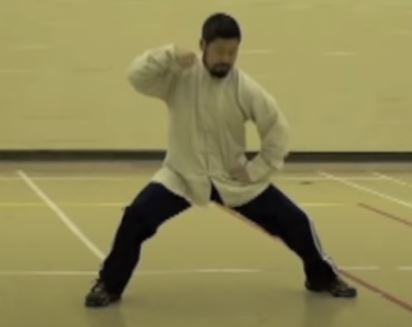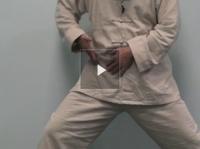I was having a conversation over dinner with my Taiji brother Nicholas Fung about the frustrations of learning Taiji. He was wondering aloud about the method for learning. As he put it, “is it understanding or is it habit? If it’s habit then we don’t need to understand it, and if that’s the case then does Master need to explain it to us?”
This was a really big query that reminded me of a question that I had while trying to reconcile what seemed to be a contradiction between Master’s advice and his teaching method. On the one hand he told us not to ask questions, not to think, and that there was a danger that if we had a concept explained to us before we were ready that we might develop a wrong idea which we could reference incorrectly in our practice. The problem being that as soon as we hear something it makes us think of something else and we begin to develop our own ideas and that they are inevitably wrong. But, on the other hand, Master Chen sometimes lectures us and introduces advanced concepts which we certainly do not yet understand. One day I asked him “do you mean to say that if we listen to you lecture that it could hinder our progress?” To which he replied “No, as long as you are inquisitive and continue to practice and strive to understand then it will be OK. It’s like an academic who goes to listen to a lecture: as long as you go home and write a really good paper it is fine.”
Now that I am writing I am reminded of two other conversations that I’ve had with Master Chen about learning which seem related. The first was about note taking. He said it’s very important to make two separate sets of notes: in the first set we must record very carefully what he said right down to the exact word usage. For example if he used the word cup but you can’t remember it, and you only remember that it was some type of container that holds liquid, do not substitute the word jar. In this case the meaning is different and it may make the teaching incorrect. It is better to not remember a lesson then to remember it incorrectly. It does not matter if you understand the teaching, but it is crucial that we do not attempt to interpret what he has said. If we must interpret, that is what the second set of notes is for. In this set we can freely write our interpretations and beliefs about the teachings as we understand them at that point. This way, later on we can look back and compare the two sets to see how our understanding has changed: gradually we will begin to understand the verbatim notes and gradually we will realize how our previous interpretations require revision or scrapping.
The other conversation was about avoiding theorizing. As Master put it, when we do something and it works, we automatically develop a theory about why it worked. Next we try to do more using our theory as a basis but we inevitably fail. The problem is that we are not privy to the things that made it work, we cannot understand. As he said, it worked because of fate, although he emphasized that it was not exactly fate in the English sense of the word.
So this leads back to the question “how can we make progress?” and “how can we understand without asking questions and theorizing?” and so forth. If we turn to Master Hong’s writing for guidance there are several passages in his book which talk about these problems. Here are two that we can contemplate while trying to make progress. Good luck everybody!
Learning
If you want to learn the routines
You must first know the theory
You must be civilized
You must also be courteous
In addition to that
You also need to know about science
Learn some dynamics
And human physiology
The methods of leverage
And spiral energies
The emptiness and solidity of energies
Are connected to blood and qi
Strengthen your body
And enhance your [martial] abilities
To know the theories
You need to find
A teacher who understands
If the teacher does not understand
He only misguides the students
The teachings of the teacher
You must record carefully
The demonstrations of the teacher
You must watch closely
From physical understanding
To mental understanding
Contemplate frequently
Practice regularly
Persist
Follow the rules
Seek progress
Don’t rush
Without knowing
Ability has increased
You also need
To have good friends
With friends
You can help each other
And experiment with each other
Ponder it
Right or wrong
All becomes clear
Natural
Follow the rules strictly
Through osmosis
You will be enlightened
The heart and hand
Will both be forgotten
At this time you are the rules
The real expert
Is Baoding the Butcher
Leaving no trace of his knife work
The movements
Are purely those of the spirit
The wonder of nature
Comes from hard training
Persist without stopping
At the higher level
You must strive to go still higher



{ 2 comments… read them below or add one }
I think it is time to revisit Master Hong’s book!
Nicholas
Well recorded Khamserk, good things will follow if you stay on this path.